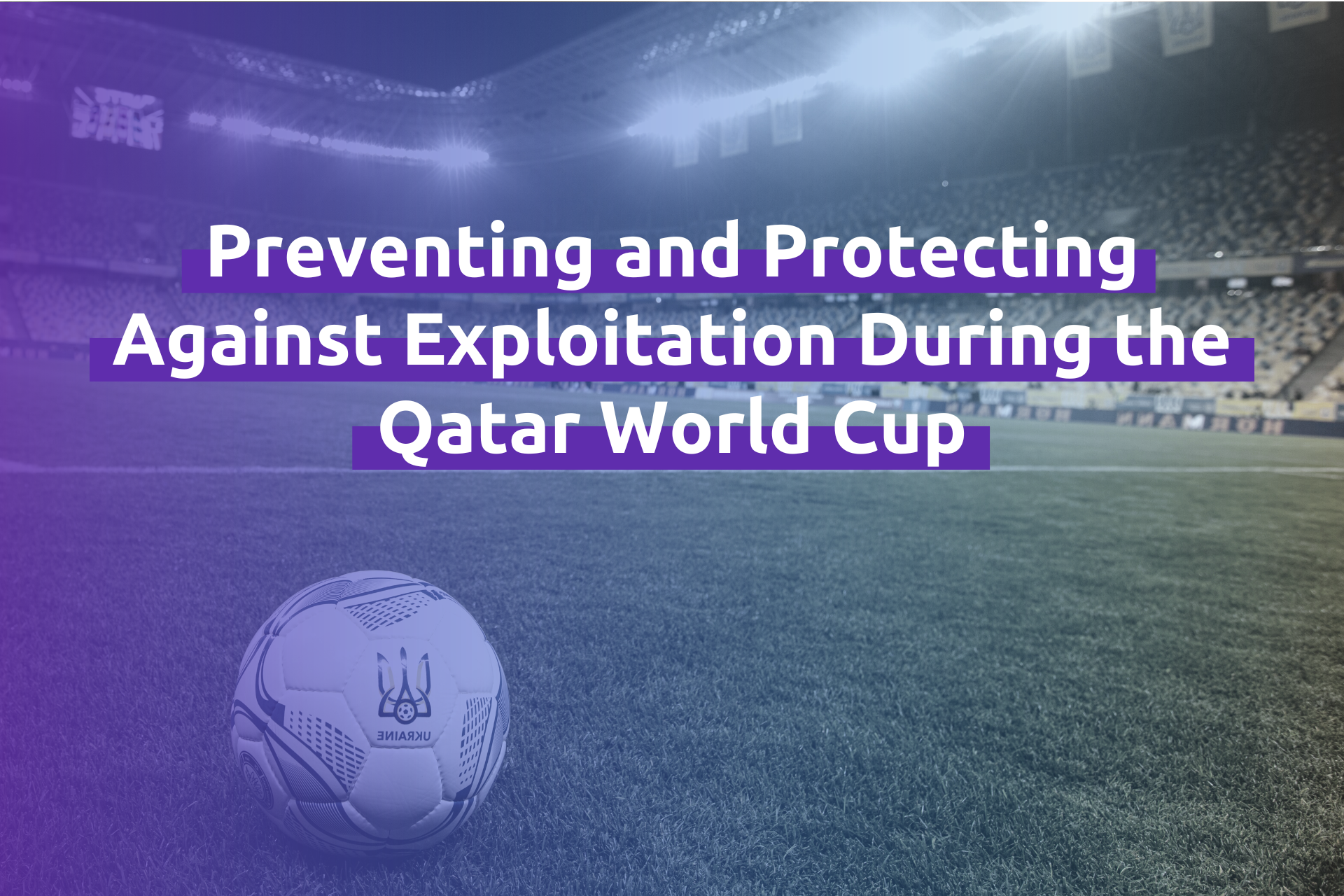
This is a guest blog written by Elizabeth Speller, Advocacy Director at It’s a Penalty.
Together with STOP THE TRAFFIK, It’s a Penalty have been collaborating on a campaign during the Qatar World Cup. Keep reading to find out what spurred on the campaign, what it consists of, and what it’s achieved so far.
In many countries around the world, human trafficking and exploitation are hidden issues. The latest estimates indicate that 50 million people worldwide are living in conditions of modern slavery (ILO, 2022). No city, country or community is immune. Despite their prevalence, these forms of violence remain largely under the radar, with many people either not believing that they take place in their communities, or not understanding how people are being exploited.
As an organisation, It’s a Penalty works to highlight the reality of these forms of modern slavery, equip people with the tools to identify and report any suspected cases, and contribute to the elimination of abuse, exploitation and human trafficking globally. We believe that prevention is even better than cure. To achieve this goal, our work consists of awareness-raising campaigns, primarily utilising the platforms of major sporting events to reach audiences of millions worldwide, education and training programmes, youth empowerment, and advocacy for legal and systematic change. Since the first It’s a Penalty campaign in 2014 during the World Cup in Brazil, It’s a Penalty has launched 13 global campaigns, reaching an average of 180 million people per campaign. Together with our partners, we have contributed to the protection of 17,000 potential victims of human trafficking and exploitation, and prevented thousands more from being victimised.
In November 2022, It’s a Penalty teamed up with STOP THE TRAFFIK to launch a joint digital-only campaign during the 2022 Qatar World Cup, aiming to help fans attending the tournament spot the signs of exploitation and trafficking.
In the lead-up-to and throughout the World Cup, modern slavery, human rights and sport have been the focus of many important conversations. To protect athletes, fans and, ultimately, those who make these mega tournaments possible, incorporating fundamental human rights standards into the planning and delivery of international sporting events is essential.
Human trafficking is present in every region of the world. However, the most vulnerable communities affected by these abuses might be different according to geographical regions. For the Gulf countries, migrant workers are the community most affected by human trafficking and exploitation. It is estimated that over 2 million foreign nationals, primarily from Asia and Africa, make up some 94% of Qatar’s workforce. According to Anti-Slavery International, it is common for migrant workers to have to pay recruitment fees, face withheld wages and threats, and find themselves unable to leave their jobs or the country. Despite promises to improve the system and reforms that have been put in place, many critics claim that better labour practices have not yet been sufficiently enforced or resulted in any real change for the workers themselves. Reportedly, according to the ILO, the Qatari government has reimbursed USD 320 million to wage abuse victims through the “Workers’ Support and Insurance Fund”. However, in practice, it has been found that many workers and their families have been excluded from its scope. Recently, calls for the fund to be extended to include all those affected since the work related to the World Cup began, covering also workers’ deaths and other human rights abuses, have gained momentum.
Many argue that the hosting of these events should not be awarded to countries in which human rights are violated, and where systematic gender-based violence is prevalent. On the other side to the argument, as suggested by British sports writer, David Goldblatt, some claim it is possible that ‘sending these mega events to more closed and authoritarian societies forces them to engage with international norms and reform follows’.
At It’s a Penalty, we believe in the power of sport to change the world, and our work at major sporting events seeks to utilise them as platforms for positive social impact. This tournament has therefore been a unique opportunity for us to mitigate risks of exploitation during the event and help protect those who are vulnerable. By working together with STOP THE TRAFFIK, our hope is to make a difference by educating, equipping and empowering fans with the information and tools to take action securely.
Intelligence gathered by STOP THE TRAFFIK prior to the start of the major sporting event indicated that the massive influx of fans could result in higher demand for workers in industries such as hospitality, transport, construction, security, and adult services. This higher demand had the potential to place these workers at risk of being exploited, or forced to do something for the financial benefit of traffickers.
This campaign has had three key aims: perception, protection and prevention. Using geotargetted adverts and a number of different media types, including videos, social media posts and webpages containing further information, the campaign communicates directly with fans who are likely to see indicators of labour exploitation in sectors such as hospitality, transport and security. Labour exploitation refers to situations where people are coerced to work for little or no remuneration, often under threat of punishment. Means of coercion can include the use of violence or intimidation, accumulated debt, retention of identity papers, or threat of exposure to immigration authorities.
Additionally, the campaign is reaching fans who may be buying adult services during the tournament and therefore come into contact with those at risk of sexual exploitation, as well as individuals who may already be in an exploitative situation themselves. Sexual exploitation is defined as involving the abuse of a position of vulnerability, power, or trust, for sexual purposes. It includes, but is not limited to, profiting monetarily, socially or politically from the sexual exploitation of another.
In light of the fact that commercial sex in Qatar is illegal, sex workers can be placed at additional risk and unable to turn to authorities for assistance if they are being exploited. Therefore, it was of critical importance that our campaign highlight this increase in risk and only direct the public to report suspected exploitation in a way that was safe for all parties.
Armed with the knowledge of what to look for, social media users are signposted towards STOP THE TRAFFIK’s STOP APP to make a report. The app is a tool that can be downloaded and used by anyone, anonymously, to report suspicious activity related to human trafficking or modern slavery.
Our goal has been to reach as many people as possible to help raise awareness of potential exploitative situations and empower them to act, if they feel inclined to do so. In order to assess the impact of the campaign further, we will launch a campaign evaluation survey to gather feedback from fans who have seen the geotargetted ads on social media.
So far, a total of 1,029,249 people have seen our joint campaign, 154,368 have learned how to respond in a culturally sensitive way and we have seen at least 25 downloads of the STOP APP. In addition, we have also signposted someone to safety who has responded to the campaign.
Learn more about the campaign here.
As the World Cup draws to a close, we must not lose sight of the significant conversations that have been taking place around it. Even though the spotlight will no longer be on Qatar, the protection of people from exploitation and human trafficking in the country, as well as all other countries around the world, are as important as ever to be addressed.
By Elizabeth Speller
Advocacy Director, It’s a Penalty


